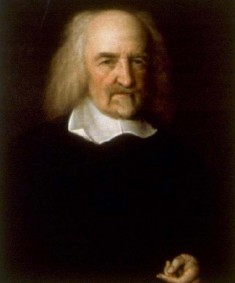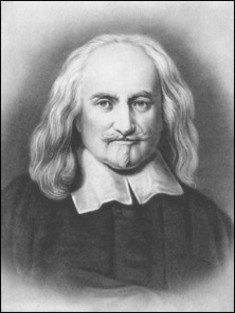| Thomas Hobbes | |
|---|---|
 |
|
| Philosopher | |
| Specialty | Political philosophy |
| Born | Apr. 5, 1588 Westport near Malmesbury, Wiltshire, England |
| Died | Dec. 4, 1679 (at age 91) Derbyshire, England |
| Nationality | English |
Thomas Hobbes was a British philosopher who is remembered for his political ideas. His philosophy is arguably the most complete materialist of the 17th century. His vision of the world was original and still used in modern politics. His main concern was the problem of political and social order and how people can live together in harmony and avoid the fear of civil conflict.
Early Years
Thomas Hobbes was born in 1588 in Westport, England. His father was a vicar of a parish. Hobbes started schooling in Westport Church at the age of four. Nonetheless, when he was seven years old, his father had a quarrel with a fellow vicar at the church. They exchanged blows and Hobbes’ father ran off. He was then raised by his uncle.
Educational Years
At the age of eight, Hobbes, who was already proficient at reading and mathematics, attended Mr. Evan’s school before attending Robert Latimer’s school in Westport. He showed his brilliance at the school and was an excellent Latin and Greek scholar by the time he left. Already an excellent student of languages, at the age of 14, Hobbes enrolled in Magdalen Hall in Oxford.
Hobbes’ Professional Career
Thomas Hobbes left Oxford in 1608 and became a tutor for the son of Lord Cavendish of Hardwick. For two years he did not study, being more of a friend to Cavendish Jr. who was younger than he was. In 1610, Hobbes travelled with his pupil to Italy, Germany, and France. He learned Italian and French on this tour, but more importantly, his trip revived his desire for learning. After returning home, Hobbes took up studying Latin and Greek again.
Hobbes moved from being a teacher to Cavendish’s son to being his personal secretary. He had ample time to dedicate to his studies. After the death of his father in 1626, William Cavendish inherited the name Earl of Devonshire, but two years later he died and Thomas Hobbes lost a friend and his secretarial job. Hobbes’ services were no longer needed by the Cavendish family and he was left searching for a new job. He was always finding himself working for different wealthy families.
Although he was linked with a number of literary personalities like Ben Johnson and Francis Bacon, Hobbes did not put much effort into philosophy before 1629. After the death of his employer, he then secured another job as a private tutor to Sir Gervase, Clifton’s son. Hobbes spent much of his time in Paris until 1631 when he got another job as a tutor to the son of his late companion, William.
A Philosopher and a Schoar
 For the next seven years, in addition to him tutoring, Thomas Hobbes engaged in expanding his knowledge of philosophy that aroused great inquisitiveness in him over major philosophic discussions. He visited Florence in 1636 and after that became a frequent debater in philosophic groups held by Marin Mersenne France.
For the next seven years, in addition to him tutoring, Thomas Hobbes engaged in expanding his knowledge of philosophy that aroused great inquisitiveness in him over major philosophic discussions. He visited Florence in 1636 and after that became a frequent debater in philosophic groups held by Marin Mersenne France.
From 1637, he started considering himself to be a scholar and philosopher. When Hobbes returned to England, he wrote a book titled Elements of Law Natural and Politic, which outlined his theory. But this work was not published. Instead, it was circulated among his friends in the form of a manuscript. He also wrote an assessment of Meditations on First Philosophy of Descartes.
Hobbes and Politics
Thomas Hobbes went back to France in 1640 to escape the civil war in his country. When the war broke out in England, many of the king’s supporters flew to Europe. Many of them went to France and were familiar with Hobbes. Hobbes re-published De Cive and it was widely circulated. The new edition had new notes suggesting the replay to objections. A company of the royalists that flew to Paris helped him to create a book to set ahead his philosophy of the government in relation to political crisis that took place as a result of the war in England.
Hobbes’ Greatest Achievements
Thomas Hobbes became the first British interpreter of the Thucydides History of Peloponnesian War. He is popular for his book Leviathan, which concerns the structure of society and the government. It is considered to be one of the most important examples of a social contract philosophy.